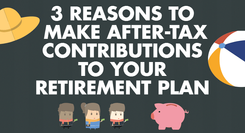Related Posts
Employers and Organizations
Financial Wellness Becomes One of the Most Desired Benefit Programs for 2021
Last Update: April 5, 2021
The onset of the COVID-19 pandemic in 2020 changed reality for many people.
Where once there was a commute to an office, now there was none.
Where once there was a job, now there was none.
Unemployment in America spiked to an all-time high of 14.8%.1
More people than ever in recorded history were out of work.
These unemployment percentages don't even include workers who were furloughed or cut to part-time.
Not only did Americans have to deal with the threat of a new virus, but shutdowns and social distancing caused economic upheaval.
Most Americans had never lived through such a nationwide crisis before, which also took an emotional toll.
Things were very bleak for much of 2020. 42% of households said their financial situation got worse since the start of the pandemic.2
Not only did 18 million people lose their jobs in April 2020, but the average length of unemployment increased from 21 weeks in 2019 to 27 weeks in February 2021, meaning many people had to find a way to pay bills for an extra six weeks.1
Many Americans were also not starting from a good situation prior to that. In 2019, before COVID was even a blip on the radar, 49% of people said they found it difficult to meet their normal expenses each month.3
That makes it nearly impossible to save for emergencies or plan for the possible loss of a job – let alone an extra month and a half of being without a paycheck.
As we emerge from the pandemic, financial wellness is more important now than ever.
Stimulus checks from the federal government will not continue to arrive in bank accounts forever.
The turmoil of the last year threw into sharp relief the need for a stable financial situation to survive the unexpected.
Many employers recognize this need.
The shift to a wellness-focused culture (mental, physical, and financial wellness) continues to pick up speed in 2021.
93% of large employers now offer financial wellness as a component in their overall wellness initiatives.4
Employers understand that financial stress leads to more issues, like poor physical health, missed work, and lower productivity.
Addressing just the physical side of wellness with health assessments and screenings is like treating a symptom instead of a cause.
Holistic wellness means understanding the interrelationship of physical health with mental health and financial health and their impacts on one another.
As Mike Shamrell, vice president for communications at Fidelity Investments in Boston, said, “it’s tough to be well in one area when you’re unwell in another.”5
2020 increased stress on workers across the board. Almost 70% of employees say that the COVID-19 pandemic has been the most stressful time in their careers.6 Some of the drivers of that increased stress were:
- Concerns about health
- Concerns about financial situations
- Worry about the loss of a job
- Changes in sleeping or eating habits7
Each of these can be potentially alleviated with the help of wellness initiatives.
Stress is not good for a company’s bottom line. Employees themselves admit to losing an hour or more of productivity a day due to stress.6
That lost productivity adds up quickly, costing companies real profits.
That is why 65% of large companies plan to expand their wellness programs in 2021.4 Focus on financial wellness as part of an overall wellness program grew 5% from 2019 to 2020.
It is expected to continue its growth as a key component in overall wellbeing.8
Companies are looking to support their workforce holistically, offering resources to reduce stress and promote all aspects of health.
Now, more than ever, the importance of financial wellness is clear.
We may be beginning to heal from the COVID-19 pandemic, but the effects will linger for many – physically, emotionally, and financially. The lessons learned during this unprecedented time must not be ignored.
April is National Financial Literacy Month, making it an ideal time for companies to examine their financial wellness programs (or lack thereof).
Financial health must be addressed continually and as a component of overall wellness, not as a standalone issue. April is a time to explore new resources that are available to understand more about personal finances.
As President Obama said in 2016, “[t]his month, let us encourage informed financial decisions and promote resources that help the American people make them.”9
1 - https://www.bls.gov/charts/employment-situation/civilian-unemployment-rate.htm
2 - https://www.nerdwallet.com/blog/average-credit-card-debt-household/
3 - https://www.theexperience.work/wp-content/uploads/2018/06/pwc-2019-employee-wellness-survey.pdf
4 - https://www.businessgrouphealth.org/en/resources/employer-sponsored-health-and-well-being-survey-executive-summary
5 - https://www.shrm.org/ResourcesAndTools/hr-topics/benefits/Pages/employers-broaden-wellness-and-well-being-programs.aspx
6 - https://www.ajmc.com/view/how-has-covid19-affected-mental-health-severity-of-stress-among-employees
7 - https://www.business.com/articles/workplace-stress-anxiety-covid-19/
8 - https://s2.q4cdn.com/997146844/files/doc_news/archive/88150356-0c7e-4f0c-9d5e-8a8aa45131b0.pdf
9 - https://obamawhitehouse.archives.gov/the-press-office/2016/03/31/presidential-proclamation-national-financial-capability-month-2016
Featured Posts

Employers and Organizations
3 MIN
10 Simple Ways Benefits Managers Can Recession-Proof Their Employee Benefits Package

Employers and Organizations
3 MIN
3 Reasons to Make After-Tax Contributions to Your Retirement Plan

Employers and Organizations
4 MIN
Financial Information vs Employee Behavior Change: Which Is More Important for Your Company’s Financial Wellness Program?

Employers and Organizations
3 MIN
Does Your Employee Financial Wellness Program Take Mindset Into Consideration?
Related Posts

Employers and Organizations
4 MIN
COVID Infected Financial Wellness But 3 Simple Steps Will Help

Employers and Organizations
5 MIN
Does Your Financial Wellness Program Teach the Right Spending and Savings Priorities to Your Employees?

Employers and Organizations
3 MIN
New Study Shows Alarming Post-COVID Financial Wellness Trends
